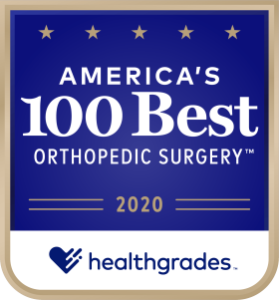 How do you know when to see an orthopedic doctor rather than your primary care physician?
How do you know when to see an orthopedic doctor rather than your primary care physician?
Save time and money by avoiding your primary care physician and going straight to the specialist who can most help you. Knowing when to visit an orthopedic clinic will help you decide whether or not you need to see one to treat your injuries or whether you need a different type of doctor.
What is an orthopedic specialist?
 To know when to visit an orthopedic clinic, it’s important to first understand what an orthopedist does.
To know when to visit an orthopedic clinic, it’s important to first understand what an orthopedist does.
Orthopedic doctors specialize in injuries to the musculoskeletal system which includes the bones, muscles, joints, tendons, nerves, cartilage, and ligaments throughout the body. You should see an orthopedic doctor any time you suspect you’ve had a traumatic or repetitive motion injury to one of these areas.
Orthopedic doctors treat injuries through both surgical and non-surgical methods such as physical therapy, medication, casting, and injections. Your doctor will evaluate your symptoms and decide the best course of treatment for you.
Orthopedists treat a variety of conditions including but not limited to:
- Arthritis and osteoarthritis
- Muscle fractures
- Rheumatology
- Pain management
- Back, spine, hand, foot, and ankle surgery
- Hip, shoulder, and join Injuries and replacement
- Physical and occupational therapy
How to know when to visit an orthopedic clinic
 You should see an orthopedic doctor if you experience any of the following symptoms:
You should see an orthopedic doctor if you experience any of the following symptoms:
- Stiffness in the joints with a reduced range of motion
- Muscle, joint, or bone pain that occured after an injury
- Hip, knee, neck, back, or bone pain that is getting worse or lasts more than 12 weeks
- Tingling or numbness in your muscles or joints
- An inability to perform everyday tasks due to these symptoms
Here are four examples of symptoms that indicate you could need to see an orthopedic specialist.
Pain from repetitive motions
If you’ve been repeating a motion over and over and are experiencing pain as a result, you could be suffering from a repetitive motion injury in a tendon, muscle, or nerve. Jobs that require workers to repeat motions or use machinery that has vibrations, require force, or cause the worker to stay in awkward positions can cause stress related injuries.
Swollen joints
Swollen joints can be an indicator of multiple issues an orthopedist can address. Swollen wrists or ankles with bruising can indicate a muscle sprain. Pulling or tearing ligaments can also cause swelling and loss of movement. Swollen, warm joints can be a sign of bursitis or arthritis.
Weak or stiff muscles
If you have had an injury that has caused bruising, weakness, or stiffness in your muscles, this could be overuse, or it could be signs of an underlying health problem. If you visit the orthopedist with muscle weakness you may be evaluated for muscle contusion or myositis.
Tingling hands
You should see an orthopedic doctor if you experience prolonged tingling or numbness in your wrists or hands or if you notice yourself dropping objects frequently. This can be a sign of carpal tunnel syndrome, a condition caused by a pinched nerve in the wrist that can be caused by injury, repetitive motions, or working with vibrating machinery.
Connect with our orthopedic specialists
At Great Lakes Orthopedic, we specialize in minimally invasive orthopedic surgery that is designed to help you heal faster and with less pain. We have served the Garden City, MI area for over 60 years and our specialists have a wealth of knowledge to help you feel your best.
To connect with our orthopedic specialists or make an appointment, give us a call at (734) 422-8400 or visit our website at www.greatlakeso.com.




